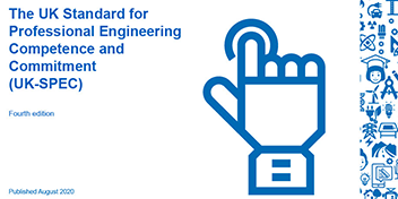Engineers and technicians should understand their professional obligations with respect to whistleblowing and know where to go for guidance and advice.
Whistleblowing Policy statement
Professional engineers and technicians are recognised for their creative, analytical and problem-solving skills achieved through a combination of technical and interpersonal competence. Occasionally, an engineer or technician may find the need to raise a concern with someone in authority, either within the workplace or externally, about wrongdoing, a danger, inadequate quantification and management of risk, or malpractice which affects others. This is generally referred to as Whistleblowing
Whistleblowing is not limited to engineering / technical matters but also includes workplace conduct, eg bullying, harassment and discrimination, which in any form is unacceptable and should be challenged.
The Engineering Council expects professionally registered engineers and technicians (Registrants) to understand their professional obligations with respect to whistleblowing and know where to go to for support when they have a concern that they believe should be raised.
Registrants shall be aware of the national legislation and company procedures applicable to their employment.
Registrants shall comply with their Institution’s Code of Conduct with respect to Whistleblowing.
Where a Registrant considers it necessary to raise a whistleblowing issue, they shall do so only when all other routes have been exhausted and in an objective, coherent and professional manner.
Licensed professional engineering institutions shall have procedures that support members who have whistleblowing concerns.
While employers are not bound by this Policy, it is expected that they will have appropriate Whistleblowing Protection Policies in place that enable their employees to raise whistleblowing concerns in a safe and unprejudiced manner.
Guidance for engineers and technicians is available below.
Whistleblowing Guidance for engineers and technicians
This guidance describes whistleblowing and the processes that engineers and technicians should follow when confronted by a potential whistleblowing situation; it has been designed to be read alongside any whistleblowing related information from your Licensed Professional Engineering Institution (PEI).
Whistleblowing is being included in institutions’ codes of conduct in line with the Engineering Council’s Guidelines for Institution Codes of Conduct.
‘Whistleblowing’ is defined by the UK Whistleblowing Commission as ‘…the raising of a concern, either within the workplace or externally, about a danger, risk, malpractice or wrongdoing which affects others’.
For engineers and technicians, ‘risk’ is interpreted to mean ‘inadequate quantification and management of risk’ which may or does affect others. A concern may include something which you may not be directly involved in but become aware of in the course of your work.
Concerns are not limited to technical and engineering issues alone, for example they can also include financial and ethical issues and workplace conduct, eg bullying, harassment and discrimination in any form, which is unacceptable and should be challenged.
In the UK the statutory categories for wrongdoing are:
- A criminal offence
- The breach of a legal obligation
- A miscarriage of justice
- A danger to the health and safety of any individual
- Damage to the environment
- Deliberate concealment of information about any of the above
Examples of wrongdoing might include (but are not restricted to):
- A criminal offence – for example, fraudulent activity
- The breach of a legal obligation by an organisation – for example, an employer has not taken action to prevent sexual harassment of workers by a third-party
- A miscarriage of justice – for example, a member of staff has been dismissed for something that turned out to be a computer error
- Someone's health and safety being in danger – for example, an employer has not provided or required workers to wear appropriate personal protective equipment
- Damage to the environment – for example, an employer has been regularly polluting local rivers
- A culture of bullying and/or harassment
- Deliberate concealment of any of the above
The Whistleblowing Commission definition covers the raising of concerns in the widest sense, and often these can be resolved quickly and constructively when brought to the attention of the organisation(s) involved. For example, many organisations have procedures in place to support workers to raise concerns, and it is often possible to resolve the concern through these internal means.
Whistleblowing is an important mechanism by which risks and wrongdoing are brought to light. The Engineering Council and PEIs value whistleblowers and support workers who come forward with disclosures in the public interest.
If your complaint is about your personal employment, or how you have been treated, it is likely the matter will be more properly dealt with through your employer’s grievance procedures. Whistleblowing is primarily for concerns where the public interest is at risk, which includes a risk to the wider public, customers, staff or the organisation itself.
You have a legal obligation to comply with the laws of the country in which you operate.
You also have an ethical responsibility to take action when you encounter a material and unmanaged risk, danger, malpractice or wrongdoing which adversely affects others.
If you are a member of a PEI, you have a professional obligation to act in line with your institution’s Code of Conduct.
- As a professional engineer or technician, you should be able to make a considered judgment on whether an issue warrants whistleblowing. In doing so you should seek expert opinion to test the legitimacy of your decision
- If you fail in your professional obligations, you may be subject to your PEI’s disciplinary procedures and you could, if professionally registered, face removal from the Engineering Council’s Register. You may become liable in law if you fail to take appropriate action when it is part of your own professional duty
- Your PEI’s Code of Conduct may have changed since you joined, so it is important to ensure that you stay up to date on your obligations
Sources of further information can be found in the document to download.
The general principles of this guidance apply in whichever country engineers and technicians are working. However, the laws affecting whistleblowing vary widely from country to country. Some countries may have little or no protective legislation in place, or it may favour the state or the employer more than UK legislation does.
In the UK, workers who blow the whistle are protected by The Public Interest Disclosure Act (PIDA), which amends the Employment Rights Act 1996. The PIDA protects whistleblowers from detrimental treatment by their employer as a result of making a public interest disclosure.
- Concerns can relate to a broad range of wrongdoing, including breaches of the law, codes or standards, risks to health and safety, environmental damage, and bullying or harassment of all kinds. Concerns can cover all aspects of a business, eg technical, financial, organisational, etc
- PIDA protects whistleblowers from detrimental treatment by their employer when a disclosure is ‘in the public interest’, which broadly means that it affects people other than yourself
- Disclosures can be made internally to your employer, or externally to, say, a regulator, or a confidential reporting scheme, but different legal tests apply depending on where a whistleblower reports the issue
- The Act provides that gagging clauses that seek to silence a whistleblower will be void
Knowing when the law applies, whether in the UK or overseas, can be complex. If you are considering raising a concern, you should contact a support organisation who may be able to provide free and confidential advice. If you are a member of a PEI, you should contact your PEI who will be able to offer support and guidance.
If you are considering whistleblowing outside the UK, you should also ensure that you are aware of local legislation and local culture. Your employer should be able to advise you on this. You can also contact the UK-based embassy of the country concerned https://www.gov.uk/working-abroad/working-abroad-for-uk-employer
It is your responsibility to ensure you understand the laws and protections applicable to the jurisdiction(s) in which you practice.
If you cannot easily address a concern on your own you should discuss it with, or report the concern to, your immediate employer or manager.
If your concern is not addressed, you should ensure you are aware of, and make use of, existing company and industry sector regulatory reporting systems. Where there is no whistleblowing policy, you should raise it with your line manager or consider who else in a more senior position than you is capable of receiving and acting on your concerns. Some examples of confidential reporting schemes and industry regulators can be found in the Further Information section at the end of this guidance.
If this approach has not resolved the concern, or your immediate employer/manager is part of the cause, then you should seek advice (through your PEI and/or support organisation) on how to escalate your concern which could mean raising it externally.
Reporting a concern internally will usually be the safest and most effective route. However, the law does not require you to report it internally first and there may be circumstances where you feel it is necessary to immediately report your concerns to an external body.
It is not advisable to use social media or other public facing routes to raise a concern.
Provided you believe that you are acting in the public interest and have a reasonable belief (ie a rational conviction based on factual evidence) in the wrongdoing, risk or malpractice, UK law offers you protection from action taken by your employer for simply reporting a concern.
Your industry may be regulated. You should make use of any reporting systems which have been put in place by, for example the Health and Safety Executive (HSE); Civil Aviation Authority (CAA); Maritime and Coastguard Agency (MCA); Office of Rail and Road (ORR) or other prescribed persons or bodies. Further information can be found in the Guidance document to download.
If you are a member of the Armed Forces or involved in protecting National Security you may, in exceptional circumstances, not be protected by PIDA. In such circumstances you will be required to work through the military chain of command and not externally. You should check with your employer.
You should not try to use the protection that relevant legislation may offer whistleblowers simply to air or extend a personal disagreement or grievance with your employer.
If your concern is a technical one which does not go beyond the application of engineering principles, your PEI may be able to provide details of organisations that can help you. Alternatively, you may want to consider approaching an independent whistleblowing support organisation.
If the concern is of a legal or Human Resources nature then it will normally be better to seek advice from your industry regulator, trade union, employee legal assistance programme or independent whistleblowing support organisation. Your institution may be able to help identify the most appropriate organisation(s) to contact.
If you are in a position of responsibility in an organisation without a clear ethical code of conduct and whistleblowing policy, you should take steps to ensure these are put in place. Useful reference sources include BS ISO 37002:2021 Whistleblowing Management Systems Guidelines, the UK Whistleblowing Commission Report recommended Code of Practice, and the Department of Business and Trade Whistleblowing Guidance for Employers.
Whoever you decide to seek advice from (and this may be more than one organisation) you should ensure that you provide all information as truthfully, objectively and clearly as possible. You should ensure that you understand and fully consider all the advice / options that you are given.

Contact your Institution ›
Find the right institution for you and learn about your professional registration membership options.

Visit the UK-SPEC page ›
UK-SPEC describes the standards for professional registration as a CEng, IEng or EngTech.

View our guidance ›
Our guidance will help you on your journey to become professionally registered with the Engineering Council.





